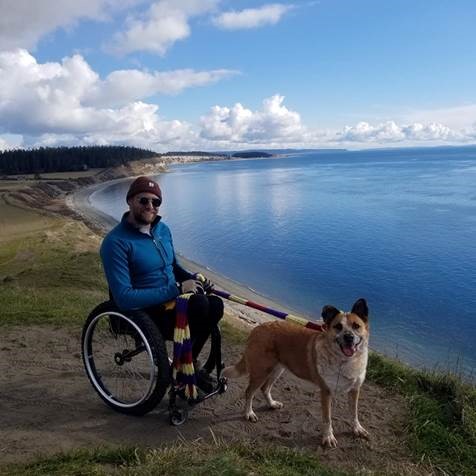ASU linguistics student explores the language of the disabled community

We all know the meaning of that blue decal with a stick figure person that hangs from rearview mirrors. What we probably don’t know is how to refer to the person it depicts.
Are they a person in a wheelchair? A person who uses a wheelchair? Wheelchair-bound?
ASU graduate student Adam Schmuki uses the latter to refer to himself, but he realizes there are some who find the term offensive. He gets it: A lifelong athlete, Schmuki first started using a wheelchair full time at the age of 13 due to a worsening spinal condition, and the “inspiration porn” narratives that often attach themselves to disabled athletes always rubbed him the wrong way.

ASU graduate student Adam Schmuki and his dog out for a hike in Washington state. Photo courtesy Adam Schmuki
Now, as a linguistics and applied linguistics major, he’s using his unique perspective to explore the complexities of the language and narratives surrounding disability through the lens of Twitter.
An avid tweeter himself, Schmuki’s interest was piqued one day last semester when he came across the hashtag #AbledsAreWeird, which normalizes disability and presents a provocative counternarrative to the widely held societal notion that disabled individuals are the “others."
At the time, he was enrolled in Associate Professor of English Matthew Prior’s Linguistics 616 course, “Discourse in Pragmatics,” which looks at language in use. He proposed the idea of investigating the unique hashtag further as part of a class project, and Prior gave him the green light.
“I wanted to focus in on how people were defining themselves as disabled,” Schmuki said. “I also was looking at how they were defining their interactions with abled people. What was ‘abled’ to them — what made ‘abled’ weird to them?”
That Schmuki considers himself part of the disabled community is important, Prior noted: “One of the interesting things he's doing for this project is looking at labels and how people within the community themselves talk about these sorts of things, whereas so much of the research is very much from the outside looking in.”
Schmuki has compiled his findings into an abstract that he will be submitting to the American Association for Applied Linguistics in the hopes of presenting at their next annual conference in March 2020. But he’s not stopping there; throughout the course of his research, he has identified several further lines of inquiry he intends to examine as a doctoral student.
“As he digs deeper into this, what he's bringing to light is that the label ‘disability’ itself is highly complex and problematic,” Prior said. “What falls under the label ‘disability’? There are people who have visible disabilities, and there are people who have invisible disabilities, and sometimes it's hard for people to recognize, and I think one of the things he's showing is that this so-called ‘disabled community’ is actually filled with a whole bunch of different kinds of experiences and histories and backgrounds and people. He's sort of peeling away the layers to show just how complex this is.”
For instance, Schmuki was intrigued to learn that some people with cognitive disorders such as autism — as well as those experiencing depression, anxiety and chronic illnesses — considered themselves disabled. He was also disheartened to see the frequency with which discussions of suicide came up among the “Disabled Twitter” community.
Schmuki understands firsthand the frustrations and challenges that come with disability. As a middle and high school student, he spent much of his time in and out of hospitals for surgery, requiring him to miss school. The system only had one way to deal with the situation, which was to send him to remedial classes he had already mastered.
He and his parents fought tooth and nail and eventually obtained a tutor who was able to keep Schmuki on track to graduate with the rest of his classmates. He hopes some of what he is uncovering in his research might inform how schools approach teaching disabled students in the future.
“It’s about understanding that it's not 'disabled or not,' it's all sorts of things, and that our education system should be prepared for that,” Schmuki said.
Top photo courtesy of Pixabay
More Arts, humanities and education
Canon brings ‘Star Wars’ cinematographer to inspire Poitier Film School students
David Klein never had a mentor.He was scrappy — and lucky — enough to succeed without one as a career cinematographer. His first feature film was the no-frills, DIY darling of ‘90s indie cinema…

Illuminating the season: How a business professor turns holiday lights into lessons on creativity and sustainability
On a December night in Chandler, Arizona, Kevin Dooley’s house doesn’t just twinkle. It beams like a beacon at the end of the cul-de-sac as the windows shimmer with color, and every corner…

Global scholars turn to ASU center to learn award-winning active learning techniques
A team of Fulbright Scholars from Brazil’s Universidade Federal de São Carlos recently set out to find the best ways to bring active learning into their classrooms. Their research led them to…